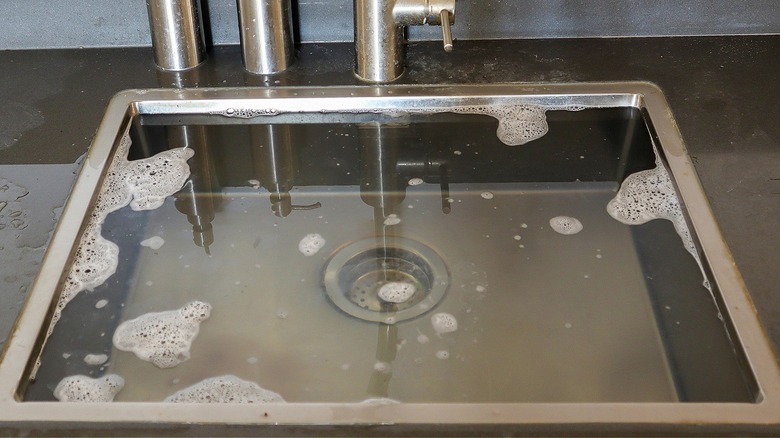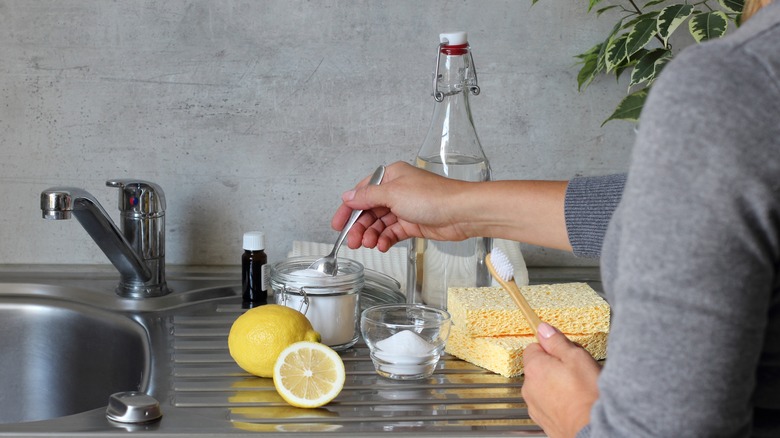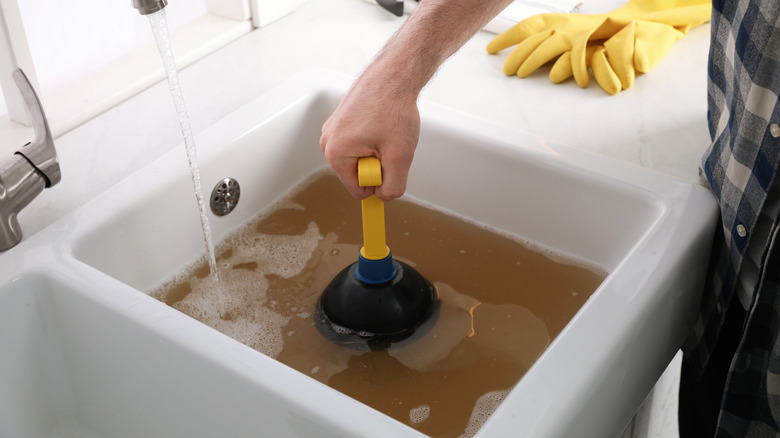Why You May Want To Avoid This Popular Drain Unclogging Hack
It's a classic combo that many cleaning sites online tout as a magic bullet for clogged drains. A mix of bicarbonate of soda, aka baking soda, and white vinegar is meant to be an effective cleaning solution that can clear drains lined by grease and scum. And depending on which site you look at, you'll also get suggestions on how to combine the two household staples to create a bubbly mix with the potential to melt your problems away.
Per Live Science, there's a chemical reason why baking soda and vinegar are such effective cleaning agents: Baking soda is a base, which has the power to dissolve material like dirt and grease, while vinegar, which is an acid, can cut through the mineral buildup caused by hard tap water. This said, some sites today are questioning the use of this mixture to fix at least one common household problem: the clogged sink.
Unclogging blocked drains
After using the baking soda and vinegar solution for years, green cleaning site blogger Brendid decided to conduct an experiment using two different household go-to solutions for clearing clogged drains: vinegar and baking soda, and dishwashing liquid and hot water. The experiment involved placing a block of butter in a dish, and then pouring both solutions on the edible fat to see which would help melt it away.
The results were eye-opening: After the baking soda and vinegar solution fizzed away, the butter emerged almost intact. At the same time, the butter in the less visually dramatic dish with hot water and detergent had vanished.
The key was the dish, which was left open. As Brendid explains, in order for a solution of baking soda and vinegar to truly work and build pressure, the environment needs to be completely closed off — on both ends. And in the case of a drain, you can only plug up one side.
TubShroom offers another reason why you should give the vinegar and baking soda combo a hard pass for unclogging your drain, saying that both chemicals can be quite corrosive, and have the ability to erode the rubber and plastic used not only to make your pipes, but to hold them together, too. In the end, the solution that you think is helping to clean pipes could be damaging them instead, as well as adding to the buildup inside your drain.
Kitchen sink drain maintenance
It might seem like common sense, but the best way to deal with clogged sinks, per HGTV, is to ensure they don't happen in the first place. One way is to use sink strainers to catch any debris and/or food waste before it makes it to the drain; this includes, of course, any materials that won't naturally break down. The outlet also warns not to pour grease down a drain — instead, decant used grease into a can to cool and dispose of, wipe oily pans and pots with a paper towel and then wash them.
In a separate post, Brendid also proposes a few ways to clean clogged drains without having to call for a plumber, which includes using a plunger after rinsing your drain with hot water; or using either hot water and salt (any type of salt will do here), or hot water and dishwashing liquid to clear out any greasy pipe build ups. In these cases, hot water is your best friend because it is able to melt down some of the grease that may be causing your pipes to clog, while either salt or dishwashing liquid works hand in hand with the hot water to break down the buildup.


